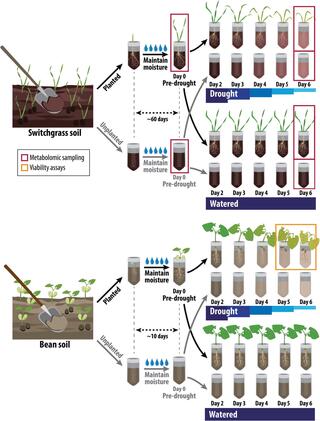Active root microbe responses to short-term drought are crop specific

Background/Objective
The microbiome associated with plant roots, the rhizobiome, can harbor beneficial microbes that alleviate stress, but factors influencing their recruitment are unclear. This greenhouse experiment investigated the impact of short-term drought severity on the recruitment of active bacteria.
Approach
Scientists with the Great Lakes Bioenergy Research Center collected soil previously used to grow switchgrass and common bean and subjected planted and unplanted samples to drought conditions for six days. They sequenced both the DNA and RNA from root-associated soils to understand the active bacterial community dynamics across both species, drought conditions, and planted and unplanted soils.
Results
Despite differences in crop-specific communities, drought rhizobiome dynamics were similar across the two crops. Researchers concluded there were plant-mediated effects of drought on the active rhizobiome only for beans, suggesting different plants have distinct engagements with rhizobiomes during drought. Certain active bacterial taxa showed increased abundance around bean roots during drought, suggesting they may help plants cope with water stress. Switchgrass produced different metabolites during drought, possibly explaining its rhizobiome stability and suggesting a decoupling of plant exudation from microbiome responses.
Impact
The increased frequency and intensity of droughts present challenges for global crop production. Deeper understanding of rhizobiome responses during drought can help improve plant resilience through targeted microbiome manipulation.